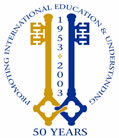
Development & Alumni Office
50th Anniversary Jubilee Themes

This academic year, 2002-3, is the 50th anniversary year of St. Clare's. Although the College is considerably larger than it was in 1953 - in terms of student numbers and premises - it shares many of the same features and characteristics. We still occupy what were once family homes - and that gives a particular intimacy and friendliness to life at St. Clare's. We still aim to provide an education of the highest quality, on each of our programmes. We still benefit enormously from our location in one of the world's leading academic cities, with its unique atmosphere and opportunities. And internationalism continues to be central to all that we do. Today's students are drawn from all the world's continents, whereas in 1953 they were entirely from Europe - and Western Europe at that. As then, we hope that students learn as much from one another as they do in the formal curriculum - about differences in cultural outlook, as well as what it means to share humanity.
A 50th anniversary is special for any institution, and at St. Clare's we are marking the golden jubilee by adopting three jubilee themes.
The first project is to launch a decade of development for our premises. In our first half century we have acquired and developed a varied collection of property to provide our central premises for teaching, activities and administration, and residential accommodation for up to 325 students. Our focus over the last five years or so has been on acquiring additional premises to give us a good basis for further development. The acquisition of the Oxford Academy premises and, more recently, 131 Banbury Road have brought us to the position where it is now the right time to do further work on the central site. We shall need to refurbish buildings, to remove some of our existing buildings of poorer quality, and to build new facilities. To work out our priorities for development, to commission a masterplan for the central site, and to undertake the first stages of a phased programme of development is likely to take ten years.
Our second initiative is to improve the funding of scholarships and bursaries on all our programmes. We would like to continue to enable students to join St. Clare's who can only do so by a financial award. Establishing a more secure financial basis for the award of bursaries and scholarships seems an admirable way to celebrate our fiftieth anniversary, and set the College well on course for its future.
Our third project concerns global citizenship. Most of our students are living their lives on a global scale. This is indicated simply by the fact that they have chosen to undertake study at St. Clare's, outside their own country. The way we lead our everyday lives - the travel we undertake, the food we eat, the energy we consume - has implications for other people on the planet. We are also members of societies which interact - by trade, political dealings, and by environmental impact. Although we hold formal citizenship of only one, or perhaps two, countries, increasingly we need also to see ourselves as inhabitants of this single and finite planet - with responsibilities to the earth and its people as a whole. This is what is we mean by 'global citizenship'. We have committed ourselves to working towards more effective global citizenship.
Initially this will mean working out our own particular understanding of the term. There is much very helpful writing on global citizenship. Oxfam, the Oxford-based development organisation, for instance, has published excellent materials on the topic. Most writers and thinkers are agreed that citizenship - global or otherwise - should include:
- Knowledge
- Skills
- Attitudes and Values
Knowledge includes global issues such as wealth and poverty, food and famine, peace and conflict, the environment and basic (political) geography.
Skills associated with global citizenship would include, for example, collaborative working, conflict resolution and appreciating/understanding other viewpoints.
Attitudes and values are a key element, and include:
- Respect for others
- Empathy
- Compassion
- Justice
- Taking responsibility for one's own actions
- Commitment and reliability
In our thinking, we are adding two further components to global citizenship.
One is experience. In developing global citizenship, students should have direct first hand contact with another culture - which could be in their own country. We think it is important to distinguish between experience, from which we learn, and simple exposure, from which we may learn nothing. So we think students should actively reflect on the experience.
Finally, there is active citizenship - or actually acting in a way which makes a difference, even if only on a very small scale. Without this action, the other elements of global citizenship have no outcome.
We shall be developing our ideas further, within this structure. We hope to do this in co-operation with schools and institutions overseas which have a different cultural outlook. It is important that thinking in the west does not unduly influence our views. We need to draw on views and perspectives from other parts of the world and other cultural traditions. I have already had contact with schools in Africa and the Middle East which we hope may join us in this exploration of what it means to be global citizens in the 21st century.
At the same time as we are developing our thinking, with other people in different parts of the world, we shall also be taking initiatives to work with students to develop them more effectively as global citizens. We expect our classes to incorporate more of the knowledge we identify as key knowledge for today's global citizen. We shall be looking at ways in which we can develop more effectively the skills associated with global citizenship. And how we can try better to foster the development of attitudes and values of the global citizen. We do not expect to do this by adding extra classes. Instead, we wish to consider how global citizenship can be promoted through our normal classes, activities programme, and the residential life at St. Clare's.
We already have a strong commitment to international affairs, and this will be key in our work to encourage students to reflect on their international experiences. For some students, we shall be trying to offer more opportunities for exposure to culturally different outlooks, within the College and by other activities in Britain and elsewhere. And lastly, the College hopes to strengthen and develop further its already strong service commitment, through which students can be active global citizens.
We have set ourselves a five year timescale for our global citizenship project. During this time, we hope to make real strides in our thinking and practice, which will set the way for further activities subsequently.
I hope that all our alumni and other friends of St. Clare's will take an interest in these jubilee themes, and support them in any ways they can. They will be very important in determining how the College looks and operates for the next few decades. More importantly, they will be important in determining the type of education we provide, and the ways in which students are influenced by their time at St. Clare's to become valuable inhabitants of this small, finite and increasingly interdependent world.
Boyd Roberts
Principal